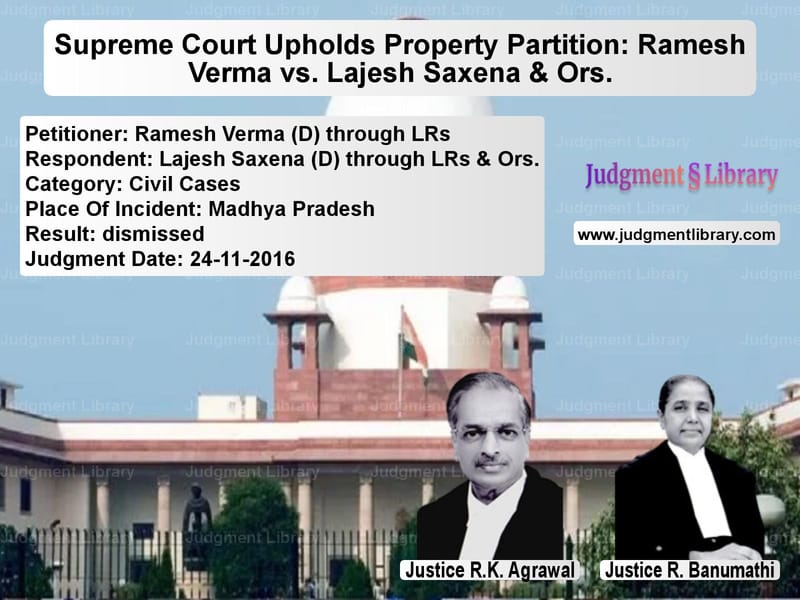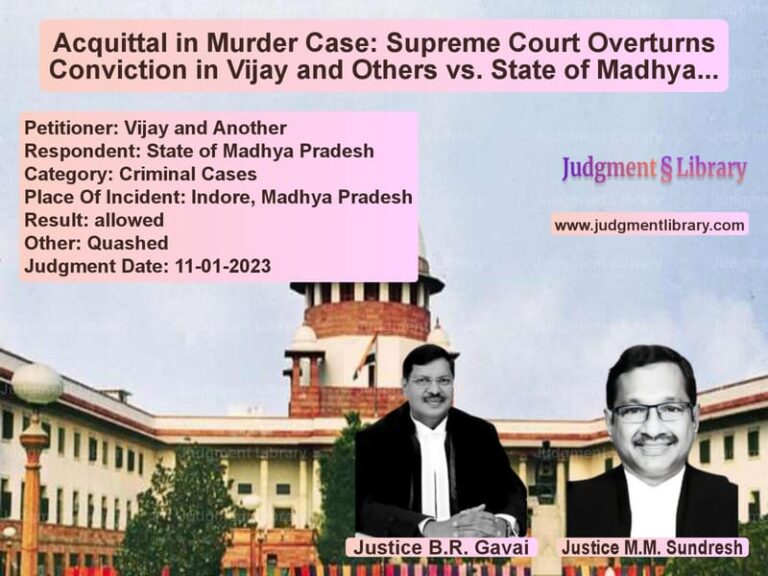Supreme Court Upholds Property Partition: Ramesh Verma vs. Lajesh Saxena & Ors.
The Supreme Court of India recently ruled on an important civil property dispute in Ramesh Verma (D) through LRs vs. Lajesh Saxena (D) through LRs & Ors., addressing the division of ancestral property under Hindu succession laws. The case revolved around a long-standing family dispute over the partition of property and the validity of wills allegedly executed by family members. The Court ultimately upheld the decision of the Madhya Pradesh High Court, granting the plaintiff a 1/3rd share in the property.
Background of the Case
The case arose from a partition suit filed by the original plaintiff, Lajesh Saxena, on February 26, 1970, claiming a 1/8th share in the family property. The dispute involved properties owned by Bhagwan Prasad Das, who died in 1952, leaving behind his widow, Smt. Jaydevi. The properties subsequently passed to their son Jagan Verma, who died in 1967, and his widow Prabhavati.
The Trial Court, in its judgment dated January 31, 1991, issued a preliminary decree for partition and ruled:
- The plaintiff, Smt. Lajesh Saxena, was entitled to 1/12th share in the joint Hindu family property.
- Defendant No.1, Ramesh Verma, was entitled to 5/12th share of the property.
- Defendants No.3 (Rajiv Verma) and No.4 (Rajat Verma) were jointly entitled to 1/12th share each.
The Trial Court also accepted two wills as genuine:
- Will dated December 7, 1969 (Exhibit D/2), executed by Jaydevi in favor of Rajiv and Rajat Verma.
- Will dated October 23, 1977 (Exhibit D/1), executed by Prabhavati in favor of Rajiv and Rajat Verma.
Being dissatisfied with the judgment, appeals were filed in the Madhya Pradesh High Court, which ruled that the plaintiff was entitled to 1/3rd share in the property instead of the earlier 1/12th. The High Court also invalidated the wills on procedural grounds.
Petitioner’s Arguments (Ramesh Verma & LRs)
- The appellants argued that the share of Jagan Verma, after his death, was governed by survivorship under the Hindu Mitakshara coparcenary law.
- The High Court erred in rejecting the wills executed in favor of Rajiv and Rajat Verma.
- Under Section 23 of the Hindu Succession Act, 1956, female heirs had no right to partition a dwelling house occupied by family members.
Respondents’ Arguments (Lajesh Saxena & LRs)
- The respondents contended that the wills were not properly proved under Section 68 of the Indian Evidence Act.
- Since Jagan Verma died in 1967, after the enactment of the Hindu Succession Act, the property should be devolved as per Section 6, allowing female heirs to claim partition.
- The property was not wholly occupied by family members, as portions of it had been rented out.
Supreme Court’s Judgment
A two-judge bench, comprising Justice R.K. Agrawal and Justice R. Banumathi, upheld the High Court’s ruling.
The Court ruled:
“The execution of the wills was not proved in accordance with Section 68 of the Indian Evidence Act, and the High Court was correct in disbelieving their authenticity.”
Further, the Court clarified that:
- The property of Jagan Verma was to be devolved under the Hindu Succession Act, and the plaintiff was entitled to her rightful share.
- Since the house was partially rented out, it was not “wholly occupied” by family members, making it available for partition.
- The High Court’s judgment did not warrant interference as it was based on well-established legal principles.
Accordingly, the appeals were dismissed, and the High Court’s order granting the plaintiff a 1/3rd share in the property was upheld.
Key Takeaways from the Judgment
- Wills Must Be Properly Proven: The Supreme Court reaffirmed the principle that wills must be proved as per Section 68 of the Indian Evidence Act.
- Female Heirs Have Equal Rights: The judgment reiterates that daughters and widows have equal rights in ancestral property.
- Partition of Dwelling Houses: If a family property is partially rented out, female heirs can seek partition under the Hindu Succession Act.
Impact of the Judgment
- Strengthens Women’s Property Rights: The ruling ensures that daughters and widows cannot be denied their rightful share in family property.
- Legal Clarity on Wills: The judgment sets a precedent for proving wills in inheritance cases.
- Judicial Efficiency: By upholding the High Court’s ruling, the Supreme Court discourages frivolous litigation in family disputes.
Conclusion
The Supreme Court’s ruling in Ramesh Verma vs. Lajesh Saxena is a landmark judgment reinforcing women’s rights to inherit property and providing clarity on proving wills under the law. By dismissing the appeal, the Court upheld the principles of equal succession rights and procedural fairness in testamentary documents.
Don’t miss out on the full details! Download the complete judgment in PDF format below and gain valuable insights instantly!
Download Judgment: Ramesh Verma (D) thr vs Lajesh Saxena (D) th Supreme Court of India Judgment Dated 24-11-2016.pdf
Direct Downlaod Judgment: Direct downlaod this Judgment
See all petitions in Property Disputes
See all petitions in Succession and Wills
See all petitions in Landlord-Tenant Disputes
See all petitions in Judgment by R K Agrawal
See all petitions in Judgment by R. Banumathi
See all petitions in dismissed
See all petitions in supreme court of India judgments November 2016
See all petitions in 2016 judgments
See all posts in Civil Cases Category
See all allowed petitions in Civil Cases Category
See all Dismissed petitions in Civil Cases Category
See all partially allowed petitions in Civil Cases Category







